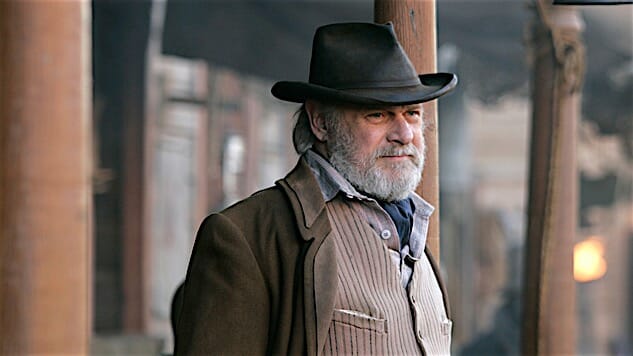Deadwood‘s Critique of the Rich and Powerful Matters Even More in 2016

It’s a cliché, but there really is so little left to say about Deadwood. It’s been ten years and Matt Zoller Seitz still hasn’t stopped writing about it, while Hitfix’s Alan Sepinwall has, in recent years, covered each episode in detail, twice. Plenty has already been written about what a marvel the show is, with its gallery of kings and rogues, its quasi-Shakespearean American Western dialogue, its thematic richness, its near-cinematic beauty. The Guardian has called Deadwood the best show HBO has ever produced, which is another way of saying it’s one of the best shows ever to come out of the US, or anywhere. Seitz simply called it “the greatest TV show ever.”
Few words are left required to testify as to what a miraculous viewing experience this is. What’s curious about the experience of watching Deadwood today though is how, to anyone unaware of the production date, the show could be interpreted as an allegory for the present, for 2016. Obviously showrunner David Milch never intended it this way. Brilliant as Milch is, he’s not—unlike the title character in his Deadwood follow-up John from Cincinnati—a seer of the future. (John from Cincinnati—proof, if it was needed, that even a genius such as Milch can, like the rest of us, fuck up from time to time.)
The drama of HBO’s revisionist western was based (loosely) on real events, features historical figures, and is set in lawless territory that actually existed—a patch of gold-infested dirt that sat between Montana and Dakota. Milch, by his own admission, could have told his story anywhere, in any time period; he chose 1870s America, but later confessed he almost told his “universal” story about the chaos of society in ancient Rome. This means any echoes of this century are simply coincidental. And yet Deadwood seems to be so full of concerns that resonate strongly now, even more so than they did when the show first hit screens.
Deadwood infamously ended prematurely in 2006, before Milch could wrap his opus up, and before some of the most important events of the last decade left the world in the state we find it in today. Deadwood was pre-ISIS, pre-Occupy, pre-Black Lives Matter. It ended before there was even a whiff of impending economic collapse. Back when Deadwood first aired, America didn’t appear quite so chaotic, and there wasn’t a president in the White House making gun control or institutionalised racism into priority issues. It was before the 2008 crash revealed the horror of inequality to so many, before Bernie Sanders went mainstream decrying the danger of the 1%.
And yet all these concerns seem to be there on the screen, and on Milch’s mind, in Deadwood. The town itself is home to both extreme poverty and extreme wealth, with everybody left to effectively fend for themselves in a familiarly trickle-up system. Always-bubbling-underneath-the-surface racism is common and accepted and bullets fly regularly. Those who keep order—or those who keep the status quo at least, like Ian McShane’s Al Swearengen or Powers Boothe’s slithery Cy Toliver, the big ‘corporations’ that really run things behind the nominal ‘men-in-charge’—rule with virtual impunity. It’s more extreme, but in terms of fundamentals, it doesn’t sound a million miles away from the America we now see on the news every day.
-

-

-

-

-

-

-

-

-

-

-

-

-

-

-

-

-

-

-

-

-

-

-

-

-

-

-

-

-

-

-

-

-

-

-

-

-

-

-

-








































